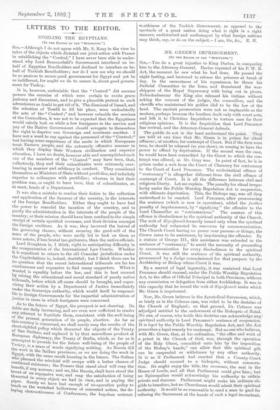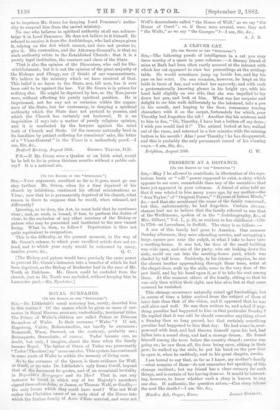MR. GREEN'S IMPRISONMENT.
ITO TIM EDITOR OF TEE " SPECTATOR.")
SI11,—You do a great injustice to King Darius, in comparing him to the Attorney-General. Darius repented of his P. W. R. Act, the moment he saw what he had done. He passed the night fasting, and hastened to release the prisoner at break of day. In the earnestness of his repentance, he threw his Judicial Committee to the lions, and threatened the wor- shippers of. the Royal Supremacy with being cut in pieces. Nebuchadnezzar the King also released his victims without asking the consent of the judges, the counsellors, and the sheriffs who maintained his golden idol to be the law of the land. The ancient persecutors were not so implacable as the modern, perhaps because the heathen dealt only with overt acts, and left it to Christian Inquisitors to torture men for their religious opinions. It is the Inquisition that Lord Penzance has revived, and the Attorney-General defends.
The public do not in the least understand the point. They are told at one time that Mr. Green is in prison for ritual offences ; at another, for contempt of Court. But if the first were true, he should be released (as you show), on ceasing to have the power to offend by deprivation. If the second were the case, he would have been committed by the Court to which the con- tempt was offered, as Mr. Gray was. In point of fact, he is in prison under a writ from the Court of Chancery for contumacy to the Court of Lord Penzance. The ecclesiastical offence of " contumacy " is altogether different from the civil offence of contempt of Court. It is all the difference between civil and religious liberty. Let me explain. The penalty for ritual irregu- larity under the Public Worship Regulation Act is suspension, with ultimate deprivation. This, the Bishops say, was all they understood to be enacted. Lord Penzance, after pronouncing the sentence (which is now in operation), added the further penalty of imprisonment, by " signifying " the offender to the Lord Chancellor as " contumacious." The essence of this offence is disobedience to the spiritual authority of the Church. The writ of Significavit formerly issued only when the spiritual authority had exhausted its resources by excommunication. The Church Court having no power over persons or things, the Crown came to its assistance, by imprisoning the offender. By a statute of George HI., this assistance was extended to the sentence of "contumacy," to avoid the necessity of proceeding to excommunication for every disobedience to the spiritual Court. It was still the sentence of the spiritual authority, pronounced by a Judge commissioned for that purpose by the Archbishop or Bishop whose Court it was.
By a marvel of legal ingenuity, it was contrived that Lord Penzance should succeed, under the Public Worship Regulation Act, to the office of Official Principal in both Provinces, without any commission or delegation from either Archbishop. It was in this capacity that he issued the writ of Significavit under which Mr. Green is imprisoned.
Now, Mr. Green believes in the Apostolical Succession, which, so lately as in the Colenso case, was ruled to be the doctrine of the Church of England ; on that ground, Dr. Colenso was adjudged entitled to the endowment of the Bishopric of Natal. ;No one, of course, who holds this doctrine can acknowledge any spiritual authority in Lord Penzance's sentence of suspension. It is legal by the Public Worship Regulation Act, and the Act prescribes a legal remedy for contempt. But no one who believes, with Mr. Green, that, at his ordination, " the office and work of a priest in the Church of God, was, through the operation imposition of the Holy Ghost, committed unto him by the mposition of the Bishop's hands," can allow that this spiritual gift can be suspended or withdrawn by any other authority. It is as if Parliament had enacted that a County-Court Judge should succeed toa bishopric, without consecra- tion. He might enjoy the title, the revenues, the seat in the House of Lords, and all that Parliament could give him ; but no Episcopalian would acknowledge his authority to ordain priests and deacons. Parliament might make his ordinees eli- gible to benefices, but no Churchman would admit their spiritual authority. It would be as reasonable to send a man to gaol for refusing the Sacrament at the hands of such a legal incumbent, as to imprison Mr. Green for denying Lord Penzance's autho- rity to suspend him from the sacred ministry. No one who believes in spiritual authority at all can acknow- ledge it in Lord Penzance. He does not believe in it himself. He refused to receive it from the Archbishops, who had always given it, relying on the Act which cannot, and does not profess to, give it. His contention, and the Attorney-General's, is that no such authority exists in the Established Church ; that it is a purely legal institution, the creature and slave of the State.
That is also the opinion of the Dissenters, who call for Dis- establishment ; but it is not the opinion of the great majority of the Bishops and Clergy, nor (I thick) of our communicants. We believe in the ministry which we have received of God. This belief is no harm to the State, nor, till now, has it ever been said to be against the law, Yet Mr. Green is in prison for nothing else. He might be deprived by law, as the Non-jurors were, without affecting his purely spiritual position. He is imprisoned, not for any act or omission within the cognis- ance of the State, but for contumacy, in denying a spiritual authority which the State does not pretend to possess, and which the Church has certainly not bestowed. It is an inquisition (I say) into a matter of purely religious opinion, and it is conducted by the lawyers against the mind both of Church and State. Of the rancour naturally bred in its familiars by patient suffering for conscience' sake, the letter of a Vicar-General " in the Vines is a melancholy proof.—I am, Sir, &c., Beeford Rectory, August 30th. GEORGE TREVOR, D.D.
P.S.—.If Mr. Green were a Quaker or an Irish rebel, would he be left to lie in prison thirteen months without a public out- cry P It is a national sin.































 Previous page
Previous page